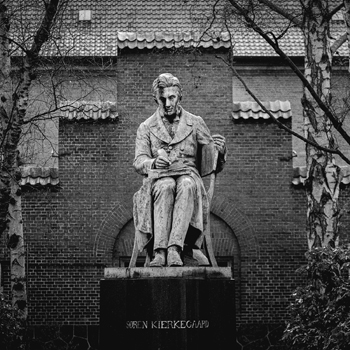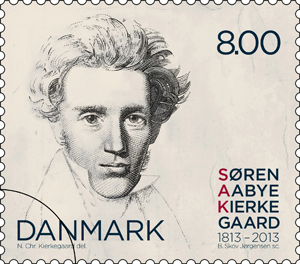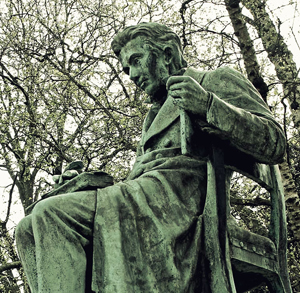| Profiles > Philosophy > Soren Kierkegaard | ||||||||||||||||||
| Soren Kierkegaard | ||||||||||||||||||
|
||||||||||||||||||
|
||||||||||||||||||
 His early publications were characterized by complex Germanic constructions and excessive use of Latin phrases. Eventually he became a master of his mother tongue -- one of the two great stylists of Danish in his time -- together with Hans Christian Andersen. Kierkegaard’s father is a constant presence in his authorship. He appears in stories of sacrifice, of inherited melancholy and guilt, as the archetypal patriarch, and even in explicit dedications at the beginning of several edifying discourses. Kierkegaard’s mother, on the other hand, never gets a mention in any of the writings – not even in his journal on the day of her death. If we read his remark in Concluding Unscientific Postscript (1846) that … an omnipresent person should be recognizable precisely by being invisible, we could speculate that the mother is even more present than the father, pervading all but the foreign language insertions in the texts. Whether or not there is any substance in this speculation, the invisibility of the mother and the treatment of women in general are indicative of Kierkegaard’s uneasy relationship with the opposite sex.
The Master of Irony and the Seductions of WritingDuring the period of his engagement, Kierkegaard was also busy writing his Master’s dissertation in philosophy, On the Concept of Irony: With constant reference to Socrates (1841). This was later automatically converted to a doctorate (1854). Kierkegaard had petitioned the king to write his dissertation in Danish – only the third such request to be granted. Usually academic dissertations had to be written and defended in Latin. Kierkegaard was allowed to write his dissertation in Danish, but had to condense it into a series of theses in Latin, to be defended publicly in Latin, before the degree would be awarded. Almost immediately after his dissertation defense, Kierkegaard broke off his engagement to Regina. He then undertook the first of four journeys to Berlin – his only trips abroad apart from a brief trip to Sweden. During this first trip to Berlin Kierkegaard completed most of the first volume of Either/Or (as much of the second volume was already completed). His early publications were characterized by complex Germanic constructions and excessive use of Latin phrases. Eventually he became a master of his mother tongue -- one of the two great stylists of Danish in his time -- together with Hans Christian Andersen. Kierkegaard’s father is a constant presence in his authorship. He appears in stories of sacrifice, of inherited melancholy and guilt, as the archetypal patriarch, and even in explicit dedications at the beginning of several edifying discourses. Kierkegaard’s mother, on the other hand, never gets a mention in any of the writings – not even in his journal on the day of her death. If we read his remark in Concluding Unscientific Postscript (1846) that … an omnipresent person should be recognizable precisely by being invisible, we could speculate that the mother is even more present than the father, pervading all but the foreign language insertions in the texts. Whether or not there is any substance in this speculation, the invisibility of the mother and the treatment of women in general are indicative of Kierkegaard’s uneasy relationship with the opposite sex.
The Master of Irony and the Seductions of WritingDuring the period of his engagement, Kierkegaard was also busy writing his Master’s dissertation in philosophy, On the Concept of Irony: With constant reference to Socrates (1841). This was later automatically converted to a doctorate (1854). Kierkegaard had petitioned the king to write his dissertation in Danish – only the third such request to be granted. Usually academic dissertations had to be written and defended in Latin. Kierkegaard was allowed to write his dissertation in Danish, but had to condense it into a series of theses in Latin, to be defended publicly in Latin, before the degree would be awarded. Almost immediately after his dissertation defense, Kierkegaard broke off his engagement to Regina. He then undertook the first of four journeys to Berlin – his only trips abroad apart from a brief trip to Sweden. During this first trip to Berlin Kierkegaard completed most of the first volume of Either/Or (as much of the second volume was already completed).
|
||||||||||||||||||
| Attack on the State Church and Death | ||||||||||||||||||
| Kierkegaard's final years were taken up with a sustained, outright attack on the Church of Denmark by means of newspaper articles published in The Fatherland (Fædrelandet) and a series of self-published pamphlets called The Moment (Øjeblikket), also translated as The Instant. These pamphlets are now included in Kierkegaard's Attack upon Christendom. The Instant, was translated into German as well as other European languages in 1861 and again in 1896. Kierkegaard first moved to action after Professor (and soon to be bishop) Hans Lassen Martensen gave a speech in church in which he called the recently deceased Bishop Jacob Peter Mynster a truth-witness, one of the authentic truth-witnesses. Kierkegaard explained, in his first article, that Mynster's death permitted him -- at last -- to be frank about his opinions. He later wrote that all his former output had been preparation for this attack, postponed for years waiting for two preconditions: Firstly, both his father and bishop Mynster should be dead before the attack, and secondly, he should himself have acquired a name as a famous theologic writer. Kierkegaard's father had been Mynster's close friend, but Søren had long come to see that Mynster's conception of Christianity was mistaken, demanding too little of its adherents. Kierkegaard strongly objected to the portrayal of Mynster as a 'truth-witness'. Before the tenth issue of his periodical The Moment could be published, Kierkegaard collapsed on the street. He stayed in the hospital for over a month and refused communion. At that time he regarded pastors as mere political officials, a niche in society who was clearly not representative of the divine. He said to Emil Boesen -- a childhood friend who kept a record of his conversations with Kierkegaard -- that his life had been one of suffering, which may have seemed like vanity to others, but he did not think it so. | ||||||||||||||||||
 I want honesty. The leniency which is the common Christianity in the land, I want to place alongside The New Testament in order to see how these two are related to one another. Then, if it appears, if I or another can prove, that it can be maintained face to face with The New Testament, then with the greatest joy I will agree to it. I have quite distinctly pointed out the difference between preaching Christianity in such a way that the preacher is a government official, a man of rank, and his preaching his own glittering career, rich in enjoyment, and on the other hand a suffering witness to the truth, without maintaining in any way whatsoever that suffering must signify suffering unto death. Inasmuch as Christianity is spirit, the sobriety of spirit, the honesty of eternity, there is of course nothing which to its detective eye is so suspicious as are all fantastic entities: Christian states, Christian lands, a Christian people, and (how marvelous) a Christian world.Kierkegaard also provided critical commentary on social change. He was an untiring champion of the single individual as opposed to the crowd. He feared that the opportunity of achieving genuine selfhood was diminished by the social production of stereotypes. He lived in an age when mass society was emerging from a highly stratified feudal order and was contemptuous of the mediocrity the new social order generated. One symptom of the change was that mass society substitutes detached reflection for engaged passionate commitment. Yet the latter is crucial for Christian faith and for authentic selfhood according to Kierkegaard.Kierkegaard's real value as a social and political thinker was not realized until after his death. His pamphleteering achieved little immediate impact, but his substantial philosophical, literary, psychological and theological writings have had a lasting effect. I want honesty. The leniency which is the common Christianity in the land, I want to place alongside The New Testament in order to see how these two are related to one another. Then, if it appears, if I or another can prove, that it can be maintained face to face with The New Testament, then with the greatest joy I will agree to it. I have quite distinctly pointed out the difference between preaching Christianity in such a way that the preacher is a government official, a man of rank, and his preaching his own glittering career, rich in enjoyment, and on the other hand a suffering witness to the truth, without maintaining in any way whatsoever that suffering must signify suffering unto death. Inasmuch as Christianity is spirit, the sobriety of spirit, the honesty of eternity, there is of course nothing which to its detective eye is so suspicious as are all fantastic entities: Christian states, Christian lands, a Christian people, and (how marvelous) a Christian world.Kierkegaard also provided critical commentary on social change. He was an untiring champion of the single individual as opposed to the crowd. He feared that the opportunity of achieving genuine selfhood was diminished by the social production of stereotypes. He lived in an age when mass society was emerging from a highly stratified feudal order and was contemptuous of the mediocrity the new social order generated. One symptom of the change was that mass society substitutes detached reflection for engaged passionate commitment. Yet the latter is crucial for Christian faith and for authentic selfhood according to Kierkegaard.Kierkegaard's real value as a social and political thinker was not realized until after his death. His pamphleteering achieved little immediate impact, but his substantial philosophical, literary, psychological and theological writings have had a lasting effect.
|
||||||||||||||||||
| Kierkegaard is sometimes regarded as an apolitical thinker, but in fact he intervened stridently in church politics, cultural politics, and in the turbulent social changes of his time. His earliest published essay, for example, was a polemic against women's liberation. It is a reactionary apologetic for the prevailing patriarchal values, and was motivated largely by Kierkegaard's desire to ingratiate himself with factions within Copenhagen's intellectual circles. This latter desire gradually left him, but his relation to women remained highly questionable. One of Kierkegaard's main interventions in cultural politics was his sustained attack on Hegelianism. Hegel's philosophy had been introduced into Denmark with religious zeal by J.L. Heiberg, and was taken up enthusiastically within the theology faculty of Copenhagen University and by Copenhagen's literati. Kierkegaard died in Frederik's Hospital, possibly from complications from a fall he had taken from a tree in his youth. He was interred in the Assistens Kirkegård in the Nørrebro section of Copenhagen. At Kierkegaard's funeral, his nephew Henrik Lund caused a disturbance by protesting Kierkegaard's burial by the official church. | ||||||||||||||||||
|
Credits
plato.stanford.edu/entries/kierkegaard/#Pol en.wikipedia.org/wiki/S%C3%B8ren_Kierkegaard www.iep.utm.edu/kierkega |
||||||||||||||||||









